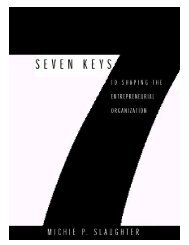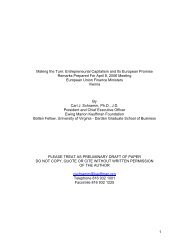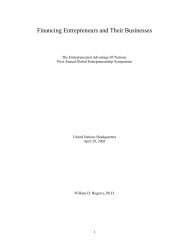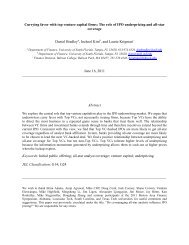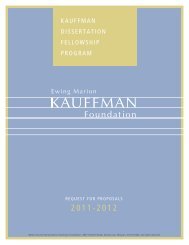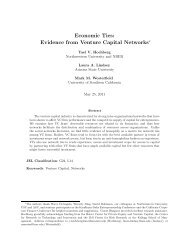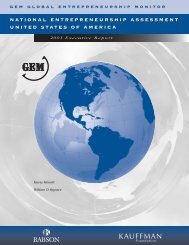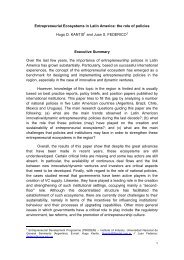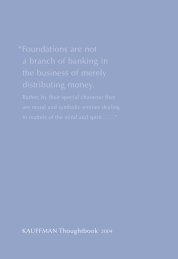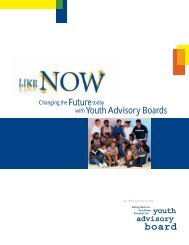Financing Child Care in the United States - Ewing Marion Kauffman ...
Financing Child Care in the United States - Ewing Marion Kauffman ...
Financing Child Care in the United States - Ewing Marion Kauffman ...
Create successful ePaper yourself
Turn your PDF publications into a flip-book with our unique Google optimized e-Paper software.
HEALTH<br />
<strong>Child</strong> health and safety <strong>in</strong> child care sett<strong>in</strong>gs pose serious public health concerns. Also of<br />
concern is <strong>the</strong> fact that child care employees are often without health <strong>in</strong>surance coverage,<br />
s<strong>in</strong>ce many child care programs do not provide health <strong>in</strong>surance as a benefit to <strong>the</strong>ir staff,<br />
and wages are typically too low to allow staff to purchase health <strong>in</strong>surance on <strong>the</strong>ir own.<br />
<strong>States</strong> have started to tackle <strong>the</strong>se problems through <strong>the</strong>ir public health, tobacco and<br />
Medicaid f<strong>in</strong>anc<strong>in</strong>g streams.<br />
In Pennsylvania, <strong>the</strong> American Academy of Pediatrics<br />
(AAP) developed a model child care public health<br />
program. Known as <strong>the</strong> Early <strong>Child</strong>hood Education<br />
L<strong>in</strong>kage System (ECELS), <strong>the</strong> program comb<strong>in</strong>es federal<br />
maternal and child health funds with <strong>the</strong> federally<br />
allocated, state–controlled <strong>Child</strong> <strong>Care</strong> and Development<br />
Fund (CCDF) dollars. New Hampshire has elected to use<br />
state health funds to support after–school programs<br />
through PlusTime New Hampshire, as part of its public<br />
health prevention strategy.<br />
<strong>Child</strong> care analysts eagerly anticipated state tobacco<br />
settlement funds as a source of public revenue that could<br />
be allocated for child care. Ma<strong>in</strong>e took <strong>the</strong> lead <strong>in</strong><br />
earmark<strong>in</strong>g a substantial proportion of its tobacco fund<strong>in</strong>g<br />
for a comprehensive early childhood <strong>in</strong>itiative. Ma<strong>in</strong>e is<br />
jo<strong>in</strong>ed by a few o<strong>the</strong>r states, but <strong>the</strong> tobacco funds have<br />
not yet been tapped rout<strong>in</strong>ely as a child care fund<strong>in</strong>g<br />
stream. For up–to–date <strong>in</strong>formation on <strong>the</strong> use of <strong>the</strong><br />
tobacco money see The F<strong>in</strong>ance Project’s website,<br />
www.f<strong>in</strong>anceproject.org or <strong>the</strong> National Conference of<br />
State Legislatures, www.ncsl.org.<br />
Some states are explor<strong>in</strong>g use of publicly–supported<br />
adult health <strong>in</strong>surance programs to meet <strong>the</strong> needs of<br />
work<strong>in</strong>g adults who do not have access to health<br />
<strong>in</strong>surance. S<strong>in</strong>ce child care teachers and providers often<br />
fall with<strong>in</strong> <strong>the</strong> str<strong>in</strong>gent def<strong>in</strong>itions of poverty and<br />
near–poverty demanded for participation, <strong>the</strong>se efforts<br />
offer a new opportunity from which child care staff may<br />
benefit. Two fund<strong>in</strong>g streams for this approach <strong>in</strong>clude<br />
Medicaid and <strong>the</strong> tobacco settlement funds. Rhode<br />
Island’s effort is already <strong>in</strong> operation, leverag<strong>in</strong>g Medicaid<br />
dollars to <strong>in</strong>crease <strong>the</strong> availability of health <strong>in</strong>surance for<br />
child care staff. For up–to–date <strong>in</strong>formation on progress<br />
<strong>in</strong> health <strong>in</strong>surance coverage for work<strong>in</strong>g adults, <strong>in</strong>clud<strong>in</strong>g<br />
child care teachers and providers, contact Jocelyn Guyer,<br />
Policy Analyst, Center on Budget and Policy Priorities,<br />
820 First Street, NE, Suite 510, Wash<strong>in</strong>gton DC 20002,<br />
(202) 408 1080, E–mail: jguyer@cbpp.org<br />
56



